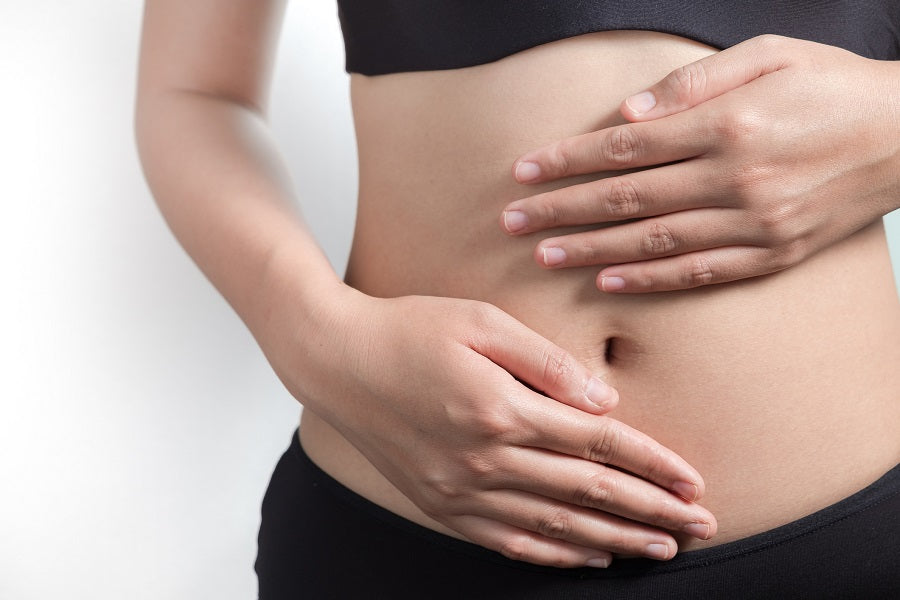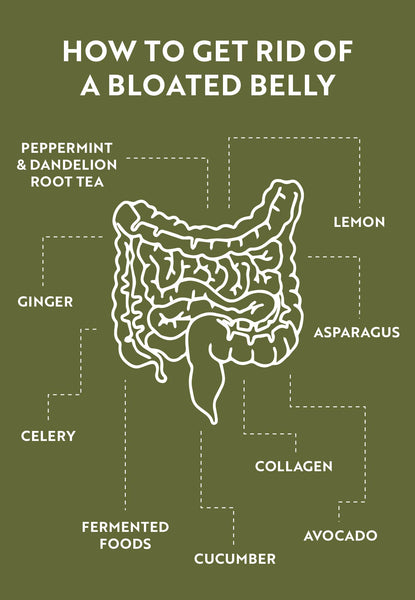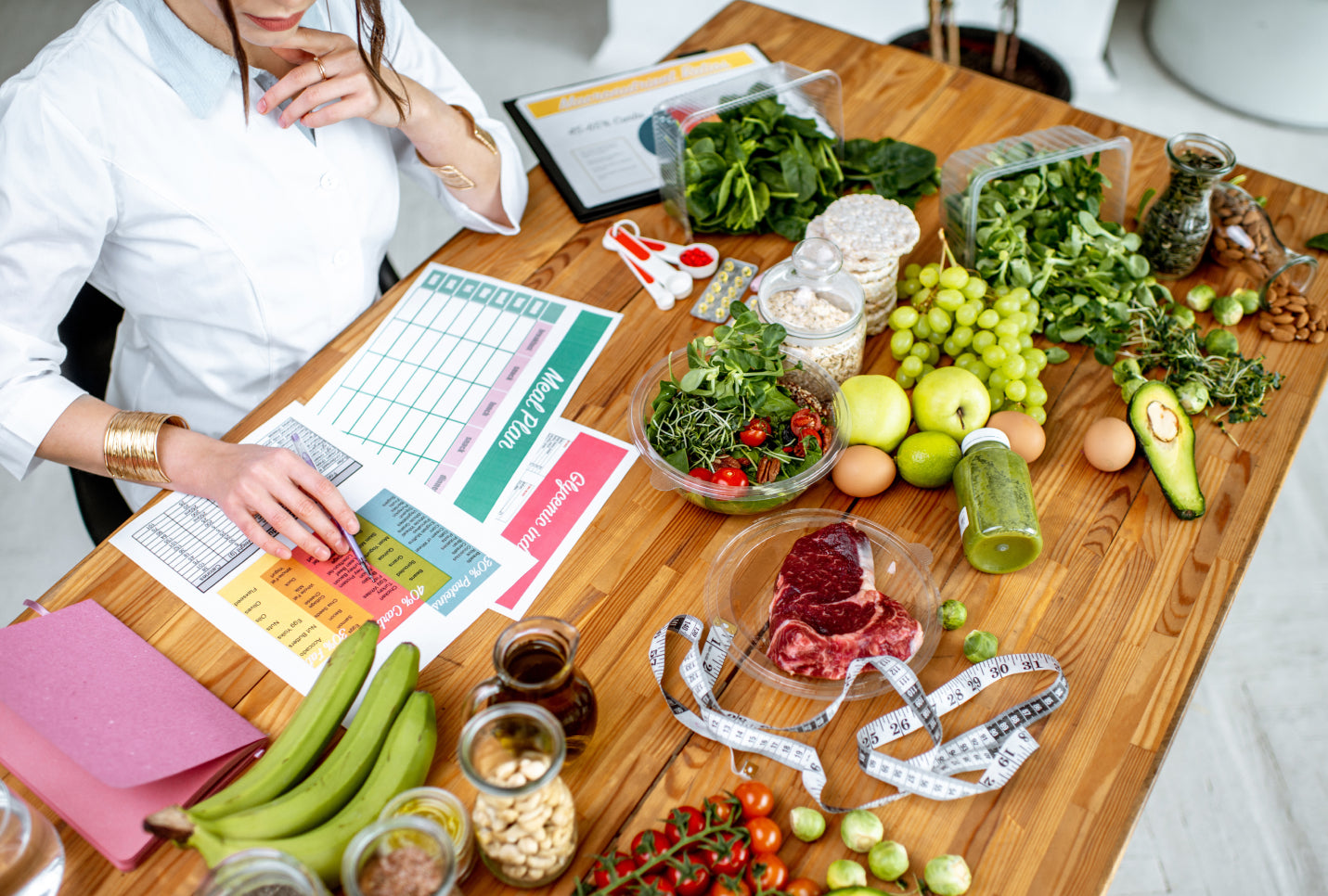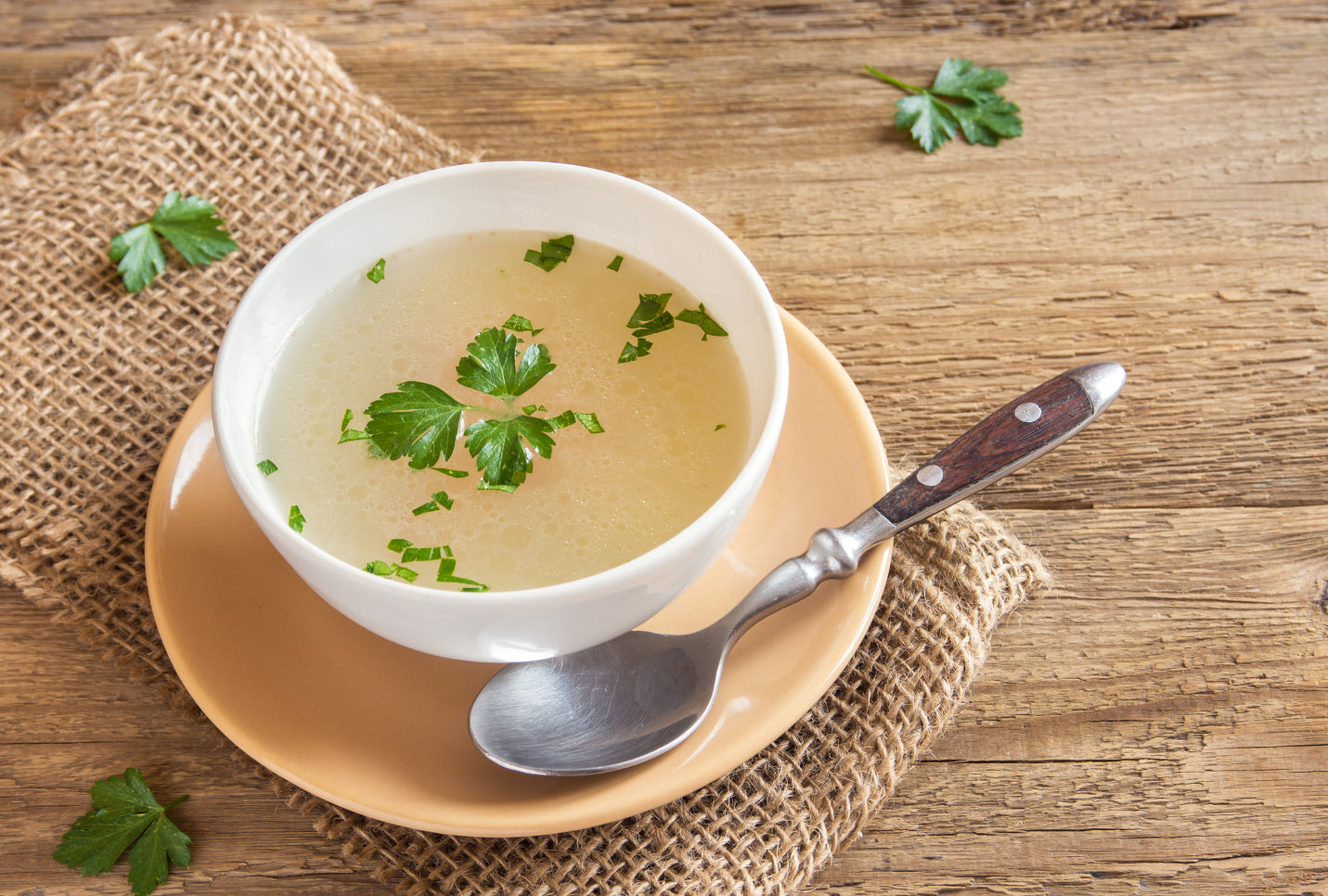
Does Collagen Help With Bloating? How to Get Rid of Bloat Fast
Bloating can make you feel like an inflated balloon that’s ready to burst and swiftly transform a radiant day into a grim one. If this sounds familiar, rest assured, you're not alone. Bloating, a common digestive complaint, can actually be linked to various digestive issues such as food intolerance and even overeating.
Rather than enduring this discomfort, remember that specific foods, spices, and herbs can help quickly soothe your bloating. These remedies are easily available at your local grocery store and might already be a part of your kitchen cabinet. Ready to combat that bloated feeling?
How Can You Alleviate a Bloated Belly?
When grappling with bloating, focus on consuming foods that are hydrating, easy to digest, and not heavy on the stomach. Keep in mind that overeating may exacerbate your digestive issues.
Here are our go-to remedies, including foods, spices, and teas, that can effectively soothe stomach bloating:

Collagen
For many, bloating is a distressing symptom of a condition termed as “leaky gut.” In this, the tight junctions between your small intestinal cells loosen, hampering your digestive system's ability to process food and absorb vital nutrients.
This also permits partially digested nutrients and pathogens to 'leak' into your bloodstream. This is why it's crucial to consume foods that can help soothe your GI tract.
Collagen can play a beneficial role here. Rich sources of collagen, such as bone broth and collagen protein supplements, are our top choices when it comes to dietary aids for bloating. In general, you may want to aim for somewhere between 2.5 and 15 grams of collagen each day.
Cucumber
In the beauty world, cucumbers are renowned for reducing puffiness around the eyes, and similarly, they can also help soothe bloating. The synergy of various nutrients, including caffeic acid (an antioxidant), vitamin C, silica, and water, contributes to this effect.
You may want to consume both the skin and the flesh to get the full benefits. Cucumbers are a refreshing snack, and you can easily incorporate them into your juices and smoothies for a bloat-busting kick.
Asparagus
Asparagus, like celery, is rich in potassium, making it a natural diuretic that can help with abdominal bloating by helping you release water weight. It's also a fantastic prebiotic that can support the healthy gut flora essential for optimal digestive function.
Consider adding roasted or grilled asparagus to your salads, add it to soups (made with bone broth, of course!), or enjoy it as a standalone dish. These dietary changes, along with regular physical activity and drinking water, can help alleviate bloating and support weight loss.
Fermented Foods
Fermented foods, such as raw sauerkraut and kimchi, are treasure troves of probiotics. These good bacteria can help facilitate digestion and absorption of food, combatting one of the common causes of bloating. Notably, lactobacillus, a predominant species in fermented foods, can support the breakdown of hard-to-digest carbohydrates.
This process produces lactic acid, which further stimulates the release of digestive juices and enzymes, which can support your digestive tract. Moreover, these beneficial bacteria can help maintain a slightly acidic environment in your colon, preventing the colonization of gas-producing bacteria that thrive in alkaline conditions.
If you're introducing fermented foods to your diet, remember to start slow; overdoing it at first may ironically trigger bloating. A tablespoon is usually all you need to reap the benefits.
Pineapple
When addressing bloating, pineapples are standouts. They're rich in bromelain, an enzyme that can help support protein digestion and soothe the digestive tract.
To leverage the maximum concentration of bromelain, ensure your pineapple is ripe, which softens the core. Using core chunks in a smoothie or fresh juice is a delicious home remedy for bloating.
Avocado
Much like celery, avocados are packed with potassium, which can help alleviate water retention — a known factor contributing to bloating. They're also a prime source of healthy fats and fiber, which can help ease constipation.
Try incorporating avocados into salads and smoothies, or enjoy them plain to support regular bowel movements.
Lemon
Lemon juice can work as an efficient digestive aid by supporting the release of bile from your liver, ensuring a seamless food movement through your digestive tract. Notably, it can also support nutrient absorption and could help flush out excess water.
Try adding fresh lemon to warm water or tea for a refreshing, bloating-busting drink.
What Herbs and Teas Help Minimize Bloating?
While there are plenty of foods you can eat to help soothe your bloat, there are also a few heavy-hitting herbs you can incorporate into your diet to add a little extra power. Read on for our top suggestions.
Capsaicin in Cayenne Pepper
Capsaicin, a substance found in cayenne peppers, can work wonders for bloating. It can support the flow of digestive juices and help release gas, thus addressing excess gasbuildup. This compound also boasts antioxidant properties and might help keep unwanted bacteria at bay.
Try adding dried cayenne powder to warm water, perhaps with a squeeze of lemon juice for a hint of sweetness.
Ginger
Ginger, known for its digestive benefits, contains phenolic compounds that can support the production of digestive enzymes.
Furthermore, ginger can help ease irritation and muscular tension in the gastrointestinal tract, soothing constipation and supporting gas release. You can try it for yourself by brewing a hot cup of ginger tea or adding fresh ginger to your smoothies.
Dandelion Root Tea
Dandelion root tea can soothe the digestive system and act as a natural diuretic, helping you shed excess water and relieve water retention. It also possesses a mild laxative effect, which can help encourage regular bowel movements.
Peppermint Tea
Peppermint tea can relax the muscles along your digestive tract, potentially soothing cramping and assisting in gas release, making it an effective solution to bloating.
What Are Other Strategies To Get Rid of Bloating?
Understanding that every individual has unique triggers and responses to bloating, it's crucial to explore various approaches. Here are some additional strategies that might help you deflate a bloated belly.
Exercise
Contrary to what you may feel when bloating strikes, curling up in bed might not be the best idea. Instead, movement is your ally in this battle. Physical activity can help release trapped gas much more effectively than staying stationary.
Opt for a brisk walk, a light jog, or ease into some gentle yoga poses to stimulate your digestive tract.
Supplements
When diet, teas, and exercise don't fully address your bloating, it might be time to consider supplements. Here are a few you may find beneficial:
Prebiotics and Probiotics
We've already explored the significance of probiotics, but prebiotics are just as crucial. Acting as the food for your gut's good bacteria, prebiotics can help these beneficial microbes flourish and outnumber the harmful ones. Probiotic supplements can be a valuable addition to your toolkit, supporting digestion and nutrient absorption.
Digestive Enzymes
Our bodies rely on enzymes to thoroughly digest food. However, some people might lack one or more of these crucial enzymes, while others may experience a natural decline in enzyme production with age. In such cases, digestive enzyme supplements can provide considerable relief from bloating.
Fiber
Bloating often occurs when you're constipated, as your body struggles to accommodate both food and waste. Fiber-rich fruits and veggies like spinach, broccoli, sweet potatoes, and avocadoscan help keep things moving.
Alternatively, if your appetite is low, consider a fiber supplement or a collagen fiber snack bar. However, remember that fiber works by drawing fluid into your digestive tract, which can also cause bloating, so start slow.
Magnesium
Magnesium is an indispensable mineral, contributing to over 300 different reactions in your body. Sadly, many of us are magnesium deficient due to a poor diet and chronic stress. Known as nature's chill pill, magnesium relaxes muscles, which can assist in releasing trapped gas and facilitating bowel movements. Soaking in a bath with Epsom salts or magnesium flakes can help replenish your body's magnesium stores.
For constipation specifically, magnesium citrate, which also draws water into your bowels, can be a useful supplement. It’s generally recommended to start with a daily dosage of 300 to 600 milligrams.
How Can You Prevent Bloating?
Bloating can be managed, and the first step is understanding the triggers. There are certain foods and beverages known to cause bloating, and steering clear of them might just save you from a bloated belly.
These include:
- Fermentable oligosaccharides, disaccharides, monosaccharides, and polyols, collectively known as FODMAPs. These can be found in various fruits, vegetables, grains, and legumes.
- Lactose intolerance, celiac disease, and a sensitivity to sugar alcohols like sorbitol.
- Chewing gum and carbonated beverages.
Incorporating dietary changes, such as a FODMAP diet, under the guidance of a registered dietitian can be helpful. Also, there are certain over-the-counter remedies, such as simethicone, that can provide relief by breaking down gas bubbles in the gastrointestinal tract.
What Foods Can You Eliminate To Prevent Bloating?
Understanding your body's response to various food items is crucial in preventing bloating. Here are some foods you might need to eliminate or limit in your diet.
Beans
Beans are notorious for causing bloating, primarily because humans lack the enzyme necessary to fully digest the complex sugars found in beans. For some people, beans may not cause discomfort, especially if consumed in small quantities or if the gas they produce escapes quickly. But generally, due to their bloating effect, it's advisable to avoid them.
However, for those following a vegan or vegetarian diet, beans might be an important protein source. In this case, properly preparing your beans by soaking or sprouting them before cooking can help predigest the sugars. You can also consider supplementing with alpha-galactosidase, a digestive enzyme designed to break down oligosaccharides in the small intestine, before these sugars reach your gut bacteria.
Gluten-Containing Grains
Gluten, a group of proteins found in wheat, spelt, rye, barley, and other grains, can be challenging to digest and can irritate your digestive tract. In some cases, gluten can also raise zonulin levels, a protein known to increase intestinal permeability, leading to what is commonly referred to as a "leaky gut."
That said, don't rush to replace gluten-containing foods with gluten-free alternatives, especially if these are processed foods. These often contain other processed flours, starches, and gums that can be equally hard to digest.
Sugar
Sugar, particularly high-fructose corn syrup, is a common ingredient in processed foods. Its abundance in foods, ranging from bread and crackers to salad dressings and pasta sauces, has led to widespread dietary issues.
White sugar and high fructose corn syrup are both problematic. High fructose corn syrup also has a higher concentration of fructose, a sugar particularly associated with bloating.
High-Fructose Fruits
While fruits offer essential nutrients, antioxidants, and fiber, some are high in fructose and can contribute to bloating.
These include:
- Apples
- Pears
- Cherries
- Mango
- Watermelon
- Fresh figs
- Dried fruits
Conversely, fruits with a lower fructose-to-glucose ratio cause minimal bloating and can be consumed in moderation.
These include:
- Berries
- Plantains
- Citrus fruits
- Pineapple
- Papaya
- Passion fruit
- Kiwi
- Honeydew
- Cantaloupe
- Avocado
Dairy
Dairy products, for some people, are primary contributors to bloating due to two main factors:
- Casein, the principal protein in milk, is among the top allergenic foods and can cause inflammation in the gut for many individuals.
- Around 75 percent of the global population has lactose intolerance, meaning they lack the enzymelactase necessary to digest lactose, the sugar found in milk. Consequently, undigested lactose can enter the colon and ferment, producing gas and causing bloating.
Alcohol
Alcohol can lead to bloating in several ways:
- High alcohol levels can disturb your body's fluid balance, leading to dehydration and water retention.
- It can irritate your digestive tract's lining, inducing indigestion, intestinal permeability, and inflammation, all known bloating triggers.
- Some alcohols, due to the yeast used in their fermentation process, contain wheat or gluten.
- Many alcoholic drinks, especially cocktails, contain high amounts of sugar and high-fructose corn syrup.
- Carbonated alcoholic beverages like beer or champagne release carbon dioxide gas into your digestive tract, leading to bloating. The same applies to all carbonated drinks.
Though it's advisable to avoid alcohol when you're bloated, if you do wish to have a drink, try to limit it to one glass of red wine or a small amount of rum, gin, or tequila on the rocks.
High-Salt Foods
Much like alcohol, an excess of refined salt can lead to dehydration and water retention. That's why it's essential to avoid heavily processed and packaged foods often loaded with refined salt.
However, seasoning your food with pink Himalayan or Celtic sea salt can be a healthier alternative, as these unrefined sea salts are generally rich in mineral electrolytes that help hydrate your body.
Artificial Sweeteners
Artificial sweeteners like Splenda, Equal, and Sweet N' Low are no better than sugar or high-fructose corn syrup. These products contain chemicals like aspartame and sucralose that are hard for your body to digest, leading to bloating.
Cruciferous Veggies
While vegetables form an integral part of any healthy diet, certain ones, like cruciferous vegetables (broccoli, kale, cabbage, and Brussels sprouts), can cause bloating in some people. Despite their health benefits, if they cause you bloating, it's generally better to consume them in moderation and try to cook them before eating.
What Causes Bloating?
It's crucial to understand that bloating isn't a condition or disease; rather, it's a symptom. Your body uses this discomfort as a signal to alert you when something's off balance.
Indigestion
Imagine starting your day with a flat tummy, feeling great and ready for the challenges ahead. But shortly after your first meal, you feel discomfort. Your clothes tighten, and your enthusiasm wanes. This scenario often happens when your body can't fully digest a particular food or ingredient that you've consumed.
The undigested food proceeds to your large intestine, where it undergoes fermentation by gas-producing bacteria. The gas released from this process causes your stomach to inflate, resembling a balloon. If your gut health is compromised, large undigested food particles can also find their way into your bloodstream, triggering further bloating.
Dehydration
While it might seem counterintuitive, dehydration can actually induce bloating as it causes your body to retain water and swell. Regrettably, it's often more challenging to shed excess water than to release gas. Extreme dehydration can even cause your face to bloat, which is not an ideal situation.
Eating Habits
Certain eating habits also contribute to bloating:
- Eating too quickly
- Eating on the go
- Eating under stressful conditions
- Eating too much
How Can You Banish Belly Bloat for Good?
As we conclude our exploration of bloating and its remedies, we reaffirm that bloating isn't a life sentence. It's a signal from your body, a call to adjust and align your dietary habits.
Using a few of the foods, herbs, and supplements we’ve discussed can be an excellent way to directly address bloating.
Additionally, understanding your triggers, whether it's gluten, beans, dairy, or artificial sweeteners, is crucial. Avoidance or mindful moderation of these foods can help keep your bloating in check.
However, remember that it's not solely about elimination. Incorporating a variety of nutrient-dense foods and ensuring adequate hydration is equally important.
Take the time to listen to your body, adjust your habits as necessary, and consider utilizing Dr. Kellyann's collagen-rich bone broth in your quest for a bloat-free life. Collagen, particularly when sourced from bone broth, can offer significant support in helping you soothe your bloating by nourishing your gut lining and calming your stomach.

Sources:
Lactose intolerance: diagnosis, genetic, and clinical factors | PMC
Lactobacillus spp. for Gastrointestinal Health: Current and Future Perspectives | PMC
Low-FODMAP Diet for Treatment of Irritable Bowel Syndrome | PMC
The Leaky Gut: Mechanisms, Measurement and Clinical Implications in Humans | PMC
Bloated Stomach: Causes, Tips to Reduce & When to be Concerned | Cleveland Clinic








